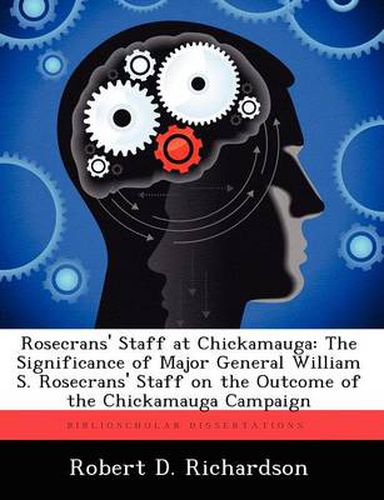Rosecrans' Staff at Chickamauga: The Significance of Major General William S. Rosecrans' Staff on the Outcome of the Chickamauga Campaign
Robert D Richardson

Rosecrans’ Staff at Chickamauga: The Significance of Major General William S. Rosecrans’ Staff on the Outcome of the Chickamauga Campaign
Robert D Richardson
This title is printed to order. This book may have been self-published. If so, we cannot guarantee the quality of the content. In the main most books will have gone through the editing process however some may not. We therefore suggest that you be aware of this before ordering this book. If in doubt check either the author or publisher’s details as we are unable to accept any returns unless they are faulty. Please contact us if you have any questions.
Probably the moat unpredictable variable in the Fog of War next to leadership, is the command and control process, comprised of three components: organizations, process, and facilities. Organizations include the formulation of staffs by the commander to accomplish the mission. Incorporated in the organization of the staffs are the roles, responsibilities, and functions. Large Civil War armies like the Army of the Cumberland and the Army of the Tennessee required significant numbers of staff officers to support the armies logistically and to maneuver them operationally. During the Campaign and Battle of Chickamauga, these staff officers often played major roles and were instrumental in determining the outcome of the battle. The roles and functions performed by these staff officers evolved through the history of conflict. This study is an analysis of the roles, responsibilities, and functions of General Rosecrans’ staff prior to and during the Chickamauga campaign, using lessons learned in comparison to current Army doctrine on command and control. Primary sources for staff information on the Army of the Cumberland are the Official Records and actual telegrams from the staffs during this period. Doctrinal manuals on senior level staffs did not exist; therefore, these staffs were composites of regimental and War Department staff positions and ad hoc positions. The study uses evolving doctrine from Command and General Staff College that defines an outstanding staff as one that informs, anticipates, coordinates and executes the commander’s guidance with enthusiasm and innovation. This study concludes that Rosecrans’ staff was significant to the outcome of the Battle of Chickamauga. Although none of the staff functions developed critical deficiencies during the campaign, their inability to relieve the commander of administrative burdens compelled him to abandon the battlefield.
This item is not currently in-stock. It can be ordered online and is expected to ship in 7-14 days
Our stock data is updated periodically, and availability may change throughout the day for in-demand items. Please call the relevant shop for the most current stock information. Prices are subject to change without notice.
Sign in or become a Readings Member to add this title to a wishlist.


